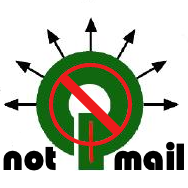Running my own email server has its challenges. Chief among them: my favorite mail-server software hasn’t been updated since I started using it in 1998.
 |
Okay, that’s not entirely true. While qmail hasn’t been updated by its original author, a group of respected users created netqmail, a series of tiny updates that were informed, conservative, and careful. By their design, it was safe for everyone running qmail to follow netqmail, so everyone did. But larger changes in the world of email — authentication, encryption, and ever-shifting anti-spam techniques — remained as puzzles for each qmail administrator to solve in their own way. And netqmail hasn’t been updated since 2007.
One fork per person
In the interim, devotees have continued maintaining their own individual qmail forks. Some have shared theirs publicly. I’ve preferred the design constraints of making minimal, purpose-specific, and conflict-avoidant add-ons and patches. Then again, these choices are motivated by the needs of my qmail packaging, which I suppose is itself a de facto fork.
I’ve found this solo work quite satisfying. I’ve learned more C, reduced build-time complexity, added run-time configurability, and published unusually polished and featureful qmail packages for over 20 platforms. Based on these experiences, I’ve given dozens of workshops and talks. In seeking to simplify system administration for myself and others, I’ve become a better programmer and consultant.
Still, wouldn’t it be more satisfying if we could somehow pool our efforts? If, long after the end of DJB’s brilliant one-man show, a handful of us could shift how we relate to this codebase — and to each other — in order to bring a collaborative Open Source effort to life? If, with netqmail as inspiration, we could produce safe updates while also evolving qmail to meet more present-day needs?
One fork per community
 |
Say hello to notqmail.
Our first release is informed, conservative, and careful — but bold. It reflects our brand-new team’s rapid convergence on where we’re going and how we’ll get there. In the span of a few weeks, we’ve:
- Started this project
- Grown to four active developers with diverse concerns, opinions, and skills
- Defined our big-picture goals (and non-goals)
- Identified milestones for future releases
- Agreed on standards for pull requests
- Merged only the changes that absolutely had to be in the first release
- Shipped our first release
I say “bold” because, for all the ways we intend to hew to qmail tradition, one of our explicit goals is a significant departure. Back in the day, qmail’s lack of license, redistribution restrictions, technical barriers, and social norms made it hard for OS integrators to create packages, and hard for package users to get help. netqmail 1.06 expressed a desire to change this. In notqmail 1.07, we’ve made packaging much easier. (I’ve already updated pkgsrc from netqmail to notqmail, and some of my colleagues have prepared notqmail RPM and .deb packages.) Further improvements for packagers are part of what’s slated for 1.08.
What’s next
Looking much further ahead, another of our explicit goals is “Meeting all common needs with OS-provided packages”. We have a long way to go. But we couldn’t be off to a better start.
By our design, we believe we’ve made it safe for everyone running qmail to follow notqmail. We hope you’ll vet our changes carefully, then update your installations to notqmail 1.07. We hope you’ll start observing us as we continue the work. We hope you’ll discuss freely on the qmail mailing list. We hope you’ll be a part of the qmail revival in ways that are comfortable for you. And we hope that, in the course of time, notqmail will prove to be the community-driven Open Source successor to qmail.

In 1.07, paths are unchanged from the old
/var/qmailstyle.FWIW, I’ve worked around this for the last 15 years by placing symlinks in
/var/qmail, which qmail’s installer happily follows. So/var/qmailpaths continue to work, but files are physically installed in sensible locations. For instance:(The qmail package in pkgsrc has done this for 15 years too, because I’m the package maintainer.)
For notqmail 1.08, we intend to address FHS/hier(7) more directly.